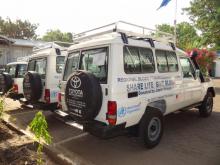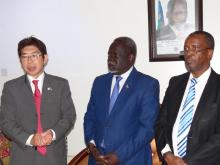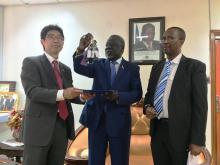Japan and WHO donate essential equipment to South Sudan’s National Blood Transfusion Services and announces plan for Public Health Emergency Operations Centre
06 March 2017, Juba, South Sudan – The Government of Japan and the World Health Organization (WHO) delivered three all-terrain vehicles for the three regional Blood Transfusion Centres in Juba, Wau and Malakal, at the end of their USD 2 million project for boosting blood donation. The three vehicles are a shot in the arm for the Regional Blood Transfusion Centres to collect more contributions through mobile blood donation drives. This will improve access to the much needed lifesaving blood supplies to health facilities including those in conflict affected areas in order to reduce morbidity and mortality.
On this occasion, Japan and WHO also revealed the additional USD 0.9 million plan to have the Public Health Emergency Operations Centre in Juba fully equipped and operational by next year. Implementing the International Health Regulations of 2005, the PHEOC is key to galvanizing South Sudan’s epidemic preparedness and response. Scaling up of the blood transfusion services will sustain with this fund.
The vehicles were handed over by the Ambassador of Japan to South Sudan, H.E. Kiya Masahiko, to the National Minister of Health, Hon. Dr Riek Gai Kok, in the presence of WHO Country Representative Dr. Abdulmumini Usman.
Kiya Masahiko, the Japanese Ambassador, explains the rationale for Japan’s continued interest in uplifting health profiles of South Sudanese: “As the emergency situation continues in South Sudan, the least we can offer is the reassurance that the life of their loved ones can be saved. The PHEOC and Blood Transfusion Services that were non-operational before our intervention symbolize the people’s right to receive better health services.”
Since 2015, the Government of Japan, through WHO, has allocated USD 4.6 million to support overall humanitarian response including the blood transfusion safety, provision of lifesaving emergency medicines and supplies, strengthening disease surveillance and outbreak response as well as training of community health workers on communicable disease control. In mid-2016, the Government of Japan donated the first batch of medical equipment to the National Blood Transfusion Services, including an enzyme-linked immunosorbent assay (ELISA) equipment, a rapid diagnostic device for screening against transmissible infections and an automated blood grouping machine, thereby improving on quality and safety of blood supplies. Solar-powered blood cold chain equipment has also been delivered, obviating the chronic challenges of power supply.
“WHO appreciates the sustained contribution to the well-being of the people of South Sudan by the Government of Japan, especially the most vulnerable,” said Dr. Usman. “In the midst of famine and dwindling funds, the dire situation of South Sudanese mothers and children is at risk of going unnoticed. South Sudan remains one of the most protracted crises in the world with 5.8 million people targeted for humanitarian assistance. This contribution is therefore very crucial as it will make a big difference to alleviate avoidable human suffering and loss of life,” added Dr Usman.
_____________________________________________________
For more information, please contact:
Dr Allan Mpairwe, Health Security and Emergency Officer, Tel: +211 955 372 370, E-mail: mpairwea [at] who.inttarget="_blank"
Mr Koji Ito, Development Cooperation, Embassy of Japan in South Sudan, Tel: +211 956 481 145, E-mail: koji.ito-2 [at] mofa.go.jp
Ms Jemila M. Ebrahim, Communication Officer, Tel: +211 950 450 007, E-mail: ebrahimj [at] who.inttarget="_blank"
Below:
01 The vehicles will boost blood donation in Juba, Wau and Malakal
02 Handing over ceremony of vehicles from the Government of Japan and WHO
03 H.E. Kiya Masahiko, the Ambassador of Japan to South Sudan and Dr Abdulmumini Usman, the WHO Country Representative to South Sudan handed over the bunch of keys for the vehicles to Hon. Dr Riek Gai Kok






